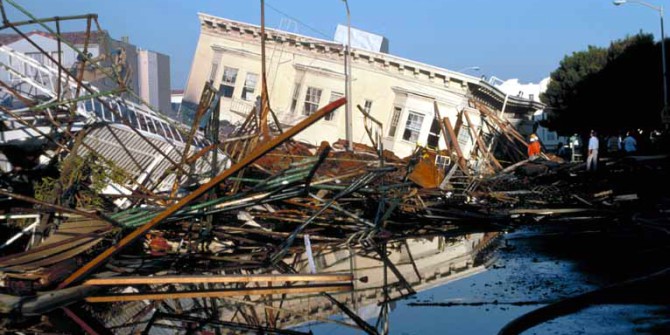
During most of Steve Job’s tenure as CEO of Apple Inc. the company did not have any long-term debt obligations. Apple started an aggressive buyback program only after Tim Cook took over, simultaneously adding debt to its capital structure. Coincidentally, San Francisco, where Steve Jobs was born, experienced more disaster-related fatalities during Jobs’ formative years than Tim Cook’s birthplace of Mobile, Alabama. This anecdote illustrates our primary hypothesis that personal experience of traumatic events shapes how a person views financial risk-taking.
A manager’s ability to assess and cope with risk has pervasive effects on corporate decision-making and CEOs are arguably among the most influential corporate decision-makers. Across several corporate policies and a diverse set of formative events, there is a growing consensus that past life experiences affect CEOs’ attitudes toward risk. For example, CEOs that grew up during the Great Depression tend to be more conservative in their debt borrowing. In our paper, we explore whether early-life experiences of natural disasters can affect how CEOs handle risk.
Early-life exposure to the consequences of environmental risk may either increase or decrease a CEO’s risk-taking behaviour. CEOs with exposure to fatalities from natural disasters may be more sensitized to the consequences of risk, and therefore be wary of decisions that increase firm risk. However, it is also plausible that childhood exposure to natural disasters may give the CEOs experience in dealing with risky situations and increase their confidence when making decisions involving firm risk. Hence, it is not immediately obvious how exposure to natural disasters affects subsequent CEO behaviour. We hypothesize that the relationship is in fact, non-linear, that CEOs with disaster experience that is not significantly fatal develop a higher risk tolerance, whereas those with exposure to major fatal disasters would be sensitized to the negative consequences of risk and therefore tend to behave more conservatively.
To test this conjecture, we examine the relation between CEO early-life exposure to fatal disasters and subsequent corporate financial and investment policies adopted by the firms that employ the CEOs. We assemble a dataset of about 1,700 US-based CEOs, their birthplaces, birth year, and any disasters that occurred in their birth county five to fifteen years after their birth. Under the assumption that the CEOs remained in their birth counties for the first fifteen years of their life, we then analyze how the disaster experience is related to a variety of firm policies related to risk-taking, like carrying long-term debt, stock return volatility, conducting acquisitions, and not holding a lot of cash.
We find that those CEOs with “moderate” exposures to disaster-related fatalities are more likely to be tolerant to firm risk-taking: they are more likely to engage in acquisitions, their firms hold more debt and less cash as a percentage of assets, and their stock returns are more volatile. In contrast, those CEOs with “extreme” exposures tend to be more cautious in their risk-taking based on these outcomes.
Recent medical research suggests a possible mechanism underlying these patterns. First, neuroscience and epigenetics studies indicate that adverse experiences affect subsequent behaviour at least partly due to permanent physiological and biological changes in the brain. Second, evolutionary biologists argue that biological systems with an original function commonly adapt to different functions, a phenomenon known as ‘co-option’. Hence, if brain development and function are physiologically altered by trauma, it is plausible that the brain functions affected by non-economic risk may be subsequently co-opted to deal with economic risk.
This is not to suggest that one should relocate in a disaster-prone area in order to raise a future CEO. CEOs are actually no more likely to have experienced a disaster or a disaster-related fatality than the average American. The ability of an individual to overcome disaster and rise to the ranks of a CEO is something we do not explore in this current study. However, our findings do suggest that boards and search committees should take into account the early-life experiences of candidates when determining whether the future CEO’s attitudes towards various corporate policies are a good fit with the needs of the company.
♣♣♣
Notes:
- This blog post appeared first on Columbia University Law School’s Sky Blog and is based on the authors’ paper What Doesn’t Kill You Will Only Make You More Risk-Loving: Early-Life Disasters and CEO Behavior, in the Journal of Finance, Volume 72, Issue 1, February 2017, Pages 167–206
- The post gives the views of its author, not the position of LSE Business Review or the London School of Economics.
- Featured image credit: Loma Prieta earthquake, San Francisco, 1989, by CIR Online, under a CC-BY-2.0 licence
- Before commenting, please read our Comment Policy.
 Gennaro Bernile is an Associate Professor of Finance at the Singapore Management University’s Lee Kong Chian School of Business. His research interests are in theoretical and empirical corporate finance; corporate governance and control; mergers and acquisitions; business valuation; venture capital and private equity; corporate disclosure; securities regulation; behavioral biases and asset pricing; institutional investor behavior; network economics; applied game theory; and industrial organization.
Gennaro Bernile is an Associate Professor of Finance at the Singapore Management University’s Lee Kong Chian School of Business. His research interests are in theoretical and empirical corporate finance; corporate governance and control; mergers and acquisitions; business valuation; venture capital and private equity; corporate disclosure; securities regulation; behavioral biases and asset pricing; institutional investor behavior; network economics; applied game theory; and industrial organization.
 Vineet Bhagwat is Assistant Professor of Finance at the University of Oregon’s Lundquist College of Business. His research interests are in the areas of corporate finance, venture capital, and mergers and acquisitions. He received his PhD from the Kellogg School of Management, Northwestern University in June 2013.
Vineet Bhagwat is Assistant Professor of Finance at the University of Oregon’s Lundquist College of Business. His research interests are in the areas of corporate finance, venture capital, and mergers and acquisitions. He received his PhD from the Kellogg School of Management, Northwestern University in June 2013.
 Raghavendra Rau is Sir Evelyn de Rothschild Professor of Finance at the University of Cambridge’s Judge Business School. He is also a past president of the European Finance Association, Head of the School’s Finance & Accounting subject group, Director (Research) of the Cambridge Centre for Alternative Finance (CCAF) and a member of the Cambridge Corporate Governance Network (CCGN). His research interests are: corporate finance; market efficiency; the acquisition and use of information by market participants in a competitive framework. Professor Rau has taught at a number of universities around the world, including the Institut d’Etudes Politiques de Paris (Sciences PO), Purdue University, the University of California at Los Angeles and most recently, the University of California at Berkeley.
Raghavendra Rau is Sir Evelyn de Rothschild Professor of Finance at the University of Cambridge’s Judge Business School. He is also a past president of the European Finance Association, Head of the School’s Finance & Accounting subject group, Director (Research) of the Cambridge Centre for Alternative Finance (CCAF) and a member of the Cambridge Corporate Governance Network (CCGN). His research interests are: corporate finance; market efficiency; the acquisition and use of information by market participants in a competitive framework. Professor Rau has taught at a number of universities around the world, including the Institut d’Etudes Politiques de Paris (Sciences PO), Purdue University, the University of California at Los Angeles and most recently, the University of California at Berkeley.





